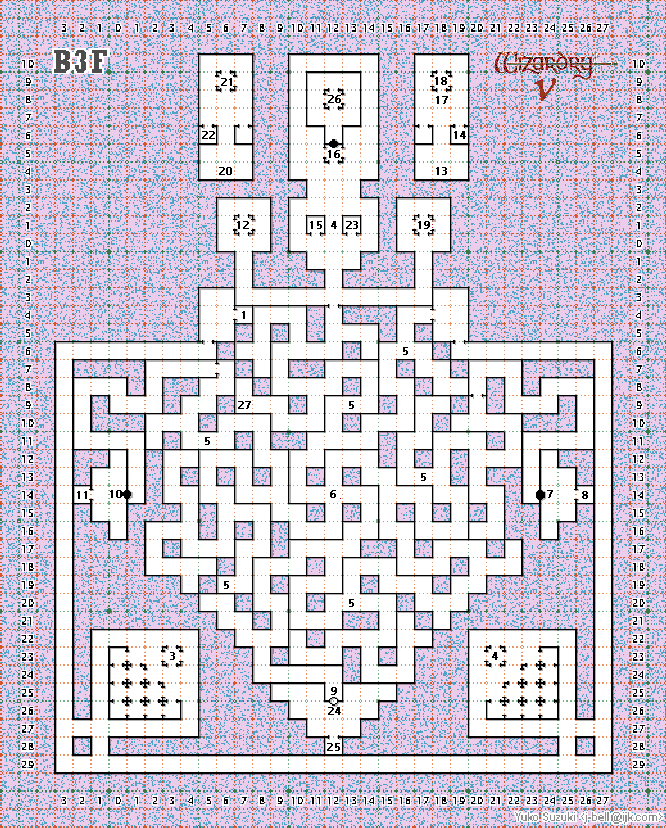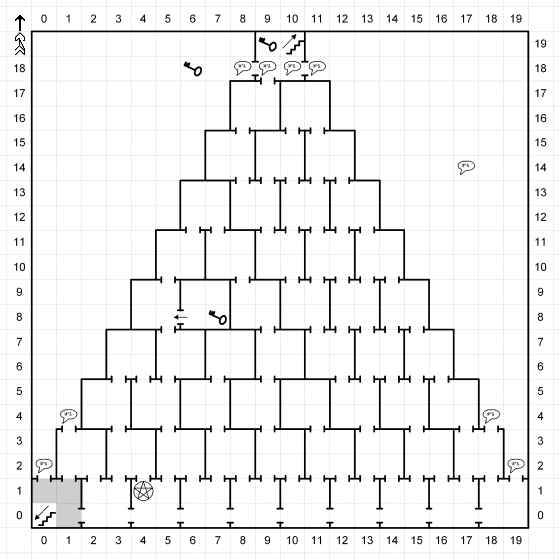wiz 1 featured one merciless oversight by the designers that everyone always forgets: it wasn't until wiz 2 that they introduced the game rule of not allowing neither enemies nor PC's to cast spells in a Surprise round. lol they had gotten inundated with complaints from players when wiz 1 came out saying how their level 12 parties or whatever would be exploring the final floors and get surprise attacked by a bunch of bad fuckers who would start their free round on the player with a non-stop barrage of tiltowaits haha
of course all that said, i firmly believe wizardry-style combat resolution is almost perfect in its dumb simplicity; it achieves a definite layer of elegance in its quick resolution but always demanding thoughtful management of resources such as spells and hit points and items. the symbiotic co-existence between the very basic attributes of wizardry combat, mainly: spells, resistances, afflictions and melee; they all compliment each other concisely and efficiently and, while of course not without flaws; the combat mechanics are in the end plainly logical and the player is rewarded for manipulating the game's systems.
an additional layer that quite simply seeps into the crevices of the combat mechanics and transforms the ENTIRE combat ritual and its repetition into one of the most elegant and well thought-out skinner-boxes i've ever personally witnessed in terms of video game application. i am of course referring to the fact that every combat is worth fighting through because every combat rewards the player with treasure, and not only that but the treasure itself is random (obvious gambling philosophies/design at work, as they are in almost every single RPG/game of course) and not only is the treasure random but there is a second phase that happens after the player wins the encounter and the player is then logically not just fighting random encounters but rather he/she is "gaming the system"; what i call "phase zero" is the player's venture into the Maze and exploring it and mapping it. during this phase there is constant tension and fear of the unknown.
the first real phase, or rather the first instance in which the wizardry player starts to engage with the games mechanical parts occurs when they get an encounter while exploring. this tests the players knowledge of ALL of the game's facets and machinations and minutiae and there is a very strong random element in the conflict resolution (i.e. stuff like damage, resistances, etc) but it never feels out of the hands of the player.
once the player wins the fight we get a second phase of conflict resolution that is entirely psychological: the disarming of the chest. as all wiz players know the most likely way you get wiped is disarming a chest, NOT fighting enemies. but the loot is waiting and you want it (for many reasons besides the obvious ones, post is already too long to explain this point in detail); the sheer rush of excitement that overwhelms the player after the tension and fear of the second conflict phase is over is similar to the feelings the player experiences when he wins a tough fight but not in any palpable, legitimate parallel: no, the disarming of the chest was a stroke of sheer genius by the wizardry designers.
and of course there is still one more (not really, there are MANY more but anyway); there is one more phase after getting the loot inside the chest and that is of course the lottery; the skinner-box in play during amateur hour. it is no arbitrary coincidence that items must be brought back to town to be identified normally, and the only way to identify them inside the Maze is by mastering more and moreof the game's many gameplay elements:in this specificexample of course i'mreferring to creating advanced classes like a bishop. even that decision interweaves PERFECTLY with every single other element that is constantly in play during the gameplay phases of wizardry: the bishop is worthless as a melee attacker, he has poor ways to defend himself from enemy attacks, he levelsmuch too slowly to keep pace with the rest of the party and he will NEVER learn his spells "fast enough"to merit giving up a valuable spot in the team for a useless bishop. except of course now the party can extend the phase zero: now the player can explore further and the possibility of beating an encounter and disarming the chest and getting an item and then having the bishop ID the item and have it EXACTLY THE SWORDYOU WANTED means that now your Samurai can deal 2x as much damage as he could 10 minutes ago, i.e. before this last fight that yielded the super sword. no bishop would mean a long trip back to town with less resources (no sword, for example) and awaste of valuable gold in paying for the item's ID'ing. even something as simple as that, the item identification and its relationship with the bishop and the shop-keeper, is absolutely overflowing with ramifications interms of emergent gameplay.














![The Year of Incline [2014] Codex 2014](/forums/smiles/campaign_tags/campaign_incline2014.png)




































